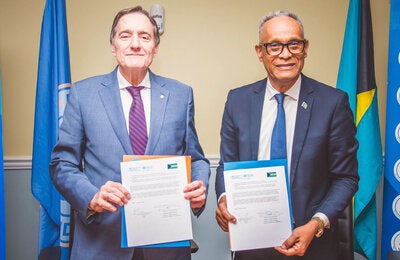

The Jamaica Ministry of Health and PAHO have launched Transfusion: Basic Guidelines, Principles and Practice. Minister of Health Hon. Rudyard Spencer is encouraging medical personnel to become familiar with and support the full implementation of the publication's guidelines and best practices.
Kingston, Jamaica, 14 September 2011 (PAHO/WHO) — On September 13, 2011, the Jamaica Ministry of Health and Pan American Health Organization launched its publication "Transfusion: Basic Guidelines, Principles and Practice". The launch of the publication took place at the Head office of the Ministry on King Street in Down Town, Kingston. Minister of Health, Hon. Rudyard Spencer invites all point of care medical personnel to become familiar with and support full implementation of this publication. It has been developed to provide guidance in the practice of transfusion medicine in accordance with good clinical practice. As such, better outcome in patient care and greater efficiency in blood and component use is anticipated in-keeping with implementation of improved clinical use of blood.
Dr. Hugo Prado, the Acting Representative in the Pan American Health Organization/World Health Organization (PAHO/WHO) in Jamaica, says that "Whatever the degree of development of the health care system, blood transfusion is the only option for survival for many patients. Provision of safe and adequate blood should be an integral part of each country's national health care policy and health care infrastructure. Every country should put in place policies, systems and structures to ensure the safety, quality, accessibility and timely availability of blood and blood products to meet the needs of all patients who require transfusion."
The life-sustaining role of blood or blood component transfusion extends beyond medical emergencies to routine surgical procedures and prolonged quality-of-life therapies. Transfusion is a unique technology in that its collection, processing and use are scientifically based, but its availability depends on the extraordinary generosity of people who donate it as the most precious of gifts — the gift of life. Therein lies the fundamental challenge: safe transfusion requires not only the application of science and technology to blood processing and testing. It also requires social mobilization to promote voluntary blood donation by sufficient numbers of people who have no infectious diseases that can be transmitted to the recipients of their blood.
"Conservative estimates based on the number of injury cases seen each year put the country's very immediate needs at approximately 45,000 units of blood annually but we only collect an average 25,000 units. The collection at most of our ten centres across the island is far below the usage in those regions. This inevitably means that medical and surgical care could be seriously compromised. This is particularly significant in a country like ours where we see a number of trauma and accident related injuries each year. Over 25,000 patients visited health centres for injuries between 2007 and 2008. This does not even include the numbers that come to our accident and emergency units at public hospitals. These figures underscore our need to increase blood collection urgently and in particular to increase voluntary donations so that we can have a steady, adequate and safe supply of blood," said Minister of Health, Hon. Rudyard Spencer.
Dr. Jose Ramiro Cruz, Senior Advisor in Health Technologies for Quality of Care, at PAHO Headquarters in Washington, D.C. adds that "Today, 62 countries have blood transfusion services based entirely on voluntary blood donation, up from 39 in 2002. In the Region of the Americas only Canada, Cayman Islands, Cuba, Netherlands Antilles, Nicaragua, Suriname and the United States have 100% voluntary blood donation. PAHO/WHO has supported a large number of countries, including Jamaica, in developing their national blood services through its Blood Transfusion Safety programme, providing policy guidance and technical assistance on working towards equitable access to safe blood and blood products and their safe and rational use."
Appreciation is extended to all those who contributed to this publication especially the National Blood Transfusion Service, the National Public Health Laboratory, University Hospital of the West Indies, Regional Health Authorities, members of the National Advisory Committee on Blood, and PAHO/WHO.
For more information please contact:
Mrs. Stephanie Shaw Smith
Manager, Public Relations & Communication
Ministry of Health
Telephone: 967-1561
Email: SmithS@moh.gov.jm
Dr. Lundie Richards
Modernization Manager
National Blood and Laboratory
Services
Ministry of Health
Telephone: 372-7903
Email: richardsl@moh.gov.jm



